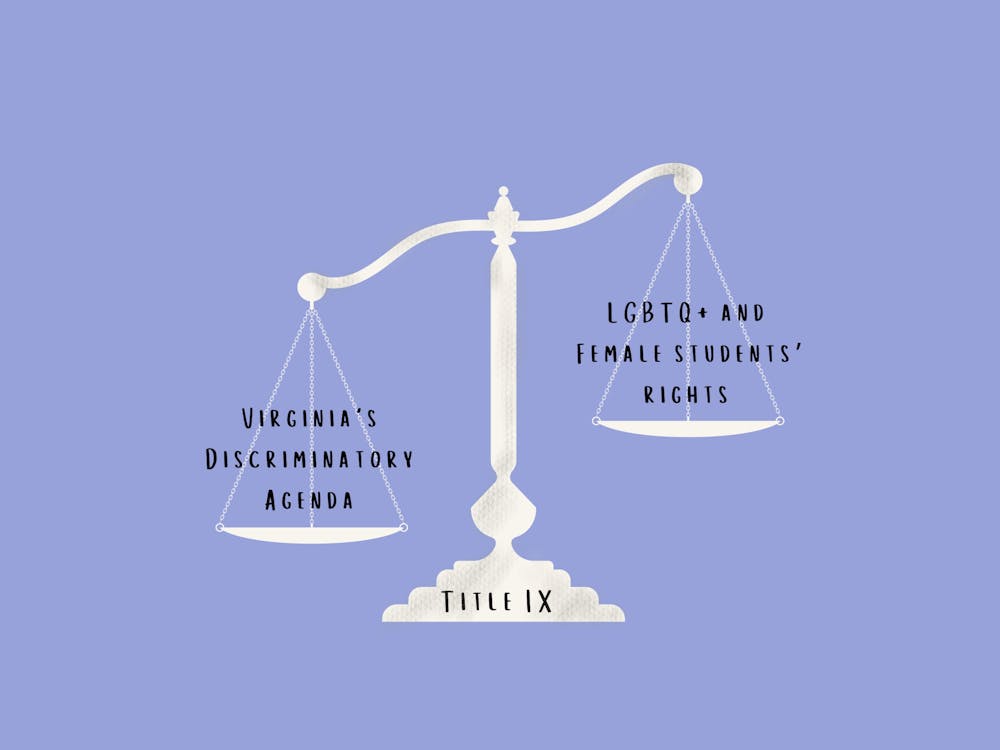This spring, the Biden Administration announced changes to Title IX, the policy that protects students from sex-based discrimination in schools receiving federal financial assistance. Importantly, these new changes will expand protections for LGBTQ+ college students, as well as improve how colleges must respond to reports of sexual harassment and assault. In light of these changes, multiple states are filing lawsuits to stop this new version of Title IX from going into effect — including Virginia. Contrary to lawsuits which actively endanger the essential implementation of Title IX, the Biden administration’s changes better protect LGBTQ+ and female students from harassment at every school level. In short, legal challenges, like that of Virginia, are an affront to the rights of millions of students nationwide.
Title IX, established in 1972, was initially created to protect women’s rights by prohibiting any federally funded school from discriminating on the basis of sex. For example, this policy provides equivalent funding for women’s and men’s sports teams at the University. Initially, protections for LGBTQ+ students were up for interpretation under “the basis of sex.” However, in 2021, the Department of Education under the Biden administration issued a notice that prohibits discrimination based on sexual orientation and identity. The new rules put forth by the Biden Administration this spring solidify this interpretation of Title IX and expand the definition of sexual harassment. Nevertheless, implementing these policy changes in states with widespread anti-LGBTQ+ discrimination is easier said than done.
In 2021, Virginia was labeled as an unsafe state for most LGBTQ+ secondary school students. Over 80 percent of students in Virginia have heard and half of students have experienced anti-LGBTQ+ treatment at school, statistics which demonstrates a massive state failure to protect this group of students. Such instances include the use of derogatory phrases, verbal and physical harassment and physical assault. It is important to realize that these statistics do not exist in a vacuum. Rather, they fit into a larger, queerphobic Virginia state agenda which has politically and socially othered LGBTQ+ students. The fact that the overwhelming majority of LGBTQ+ students have experienced this torment should sound alarm bells for the state — and federal government — to establish protections for LGBTQ+ students.
And given that current state policies persistently discriminate against these students, federal protections are all the more vital. Unsurprisingly, state challenges to increased federal protections for LGBTQ+ students are buttressed by the same officials who traffic in queerphobic policies. Consider Gov. Glenn Youngkin — since his election, the Youngkin administration has limited protections for transgender and LGBTQ+ students’ rights. Ignoring the advice of youth health professionals, Youngkin’s officials repeatedly removed LGBTQ+ youth resources from state websites, including a moderated online support chat and phone numbers for emotional support services. Most recently, the 2023 Virginia Department of Education released policies which allow teachers to misgender transgender students. Clearly, Virginia’s LGBTQ+ youth is in dire need of these new Title IX changes which must step in to protect them in spaces where their own state officials do not.
Virginian officials and other states are challenging the changes to include LGBTQ+ students in Title IX because they claim the changes would “jeopardize'' protections for women. In fact, Attorney General of Virginia Jason Miyares called the changes to Title IX a “dangerous overhaul” of protections for women. In reality, this "overhaul" of the system merely affirms an already existing and accepted interpretation, while in no way lessening protections for women. Moreover, Virginian officials seem to have forgotten that the recent changes to Title IX also include provisions which make it easier for all students to report sexual assault and other incidents to universities without threat of retaliation.
These specific changes fundamentally enhance protections for women. For example, at the University, these new provisions to better protect against sexual assault strike close to home. The October attempted abduction of a female student as well as rising violent crime rates in Charlottesville raises an important question of maintaining student safety on Grounds — especially for female students. These changes in the procedure for reporting sexual assault will not address the root causes of crime, but they will ensure that victims are able to appropriately report their abusers.
Youngkin’s administration seems to think it is impossible to protect one group while protecting another. On the contrary, women and LGBTQ+ students must be simultaneously protected because their rights are intersectional — protecting students against gender and sexuality-based discrimination inherently means protecting women and LGBTQ+ students. We should all support policy that protects these groups from further discrimination from government actions rooted in patriarchy and heteronormativity.
It is disappointing at best and horrifying at worst that Virginia’s officials are actively creating obstacles to supporting students, regardless of what sex, gender identity or sexual orientation they are. These officials must not only cease their challenge to Title IX but also institute these needed improvements throughout Virginia schools immediately. Across states who have followed the command of the government, the changes to Title IX will ostensibly protect LGBTQ+ students from discrimination and harassment, as well as reinstate vital protections for women following years in which the Trump Administration decreased them. Despite the flurry of states challenging these efforts, the changes are an essential and hard-fought response to the dire need to protect every student at every level against any sex or gender-based harassment.
Apal Upadhyaya is a senior columnist who writes about politics for The Cavalier Daily. She can be reached at opinion@cavalierdaily.com.
The opinions expressed in this column are not necessarily those of The Cavalier Daily. Columns represent the views of the authors alone.







